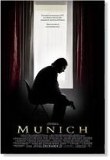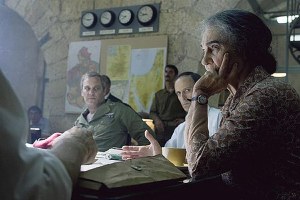 Chapters
Steven Spielberg, Tony Kushner, Eric Bana, Daniel Craig, Geoffrey Rush, Azelet Surer, and more.
Slaughter during Olympic Games and follow-up Operation Wrath of God.
Steven Spielberg explores a definitive moment in history.
Steven Spielberg brings Pulitzer Prize-winning Tony Kushner.
Global cadre of 200 actors joins the production.
Steven Spielberg and Janusz Kaminski update gritty '70s thriller.
Bringing a hidden world to light in Malta, Hungary.
Ain't No Sunshine, Papa Was A Rollin' Stone, Ela-Ela, Black Magic Woman, Prelude To A Kiss, Palamakia, and more.
|
The director's immediate way into the story lay in the realms of suspense and human emotion. Spielberg became intrigued by a question that had never been publicly addressed: How did this covert mission affect the men assigned to carry it out? To explore that question, Spielberg and Kennedy brought in Pulitzer Prize-winning playwright Tony Kushner to work on the screenplay after Eric Roth (Forrest Gump, The Insider) wrote a draft inspired by the book Vengeance by Canadian journalist George Jonas.
Kushner's internationally lauded play Angels in America had brought forth a multi-layered examination of the social, political, sexual, racial and religious questions facing the nation at the end of the 20th century, but he had never written a screenplay. Kushner met with Kathleen Kennedy and was intrigued by the probing concept for Munich she presented to him. “I saw that what they were proposing was a very murky, problematic and complicated story not about the massacre itself, but about the aftermath and about the policy of targeted assassination, and I became very interested,” he recalls.
At first Kushner simply wrote notes for Spielberg on the existing screenplay, declining to try his hand at a feature film. Spielberg relentlessly pursued him, however, and Kushner accepted the challenge.
For Spielberg, Kushner's participation was key. “I wasn't really sure I was going to make Munich until I began reading Tony's words, and then everything immediately coalesced for me,” says the director. Adds Kennedy, “I think Steven felt he was now in a creative partnership with someone who really understood the complexity of these issues. He knew he was on the way to having a screenplay he would feel comfortable shooting.”
Kushner distinctly recalls his own experience of the 1972 Olympics, a memory he drew upon as he began his exploration. “It was a transformative moment,” he says. “I was 17 years old and it was a very stark thing for me and my family. It was heartbreaking, devastating. I remember a lot of anger in America and especially a great deal of rage that the situation had been blown so badly.”
Yet Kushner hoped to approach the story with as blank a slate as possible, coming at it without any singular point of view and aiming more at baring provocative questions than providing any pretense of black-and-white answers. “It's a story filled with paradoxes and contradictions,” he notes. “It's also a story about a covert operation, so nothing is entirely known for sure and most likely nothing ever will be. So, we gave ourselves some permission to invent and to deal with these characters on a more human level. I feel we have created a very scrupulous piece of what I would call `historical fiction.'”
Forging these characters on a deeper, more humanized level brought a myriad of challenges. “I always like to do difficult things,” admits Kushner. “And the big difficulty of writing this story-as was made clear from the beginning-is that our main dramatic agents, our protagonists, are five guys who are assassinating people. They had to be plausible as secret agents, not in the James Bond sense, but in the sense of real field operatives working for an intelligence agency-and at the same time, there is this question of, `Who are these guys really?' So what was fascinating for me was calibrating these characters, especially Avner.”
He continues, “Avner is the leader of the group, although not in any conventional sense. But how does his conscience become unsettled? How does this sort of intersection of his own internal ethics and his sense of survival come into play? It became more and more the story of a man whose decency just won't let him off the hook.”
For a long time, the project remained untitled, but as Kushner wrote, he became enamored with Munich, which also struck Spielberg as taking precisely the right understated tone for a film that presents a singular event that evolves into a persistent moral conundrum.
“I like the simplicity of it because I think this is a film that starts with a stark, historical fact and then it shows that there's nothing simple about it at all and that all the certainties that might seem to surround it can also be questioned,” Kushner explains. “There's also an immense resonance to the name Munich. It's the birthplace of Nazism and of the Munich of 1972, all at once. It has a kind of iron ring that seems appropriate to the relevance of the story.”
Even with all the intense collaboration on the screenplay, Kushner was excited to see where Spielberg would take the story once the cameras were rolling. “No one does suspense better than Steven,” he comments. “In all of his films you know you will be put directly in the middle of what's happening. The interesting thing is that inside this suspense thriller, you also get pulled intellectually into questions that lead into even more questions. I think he found a way to blend an amalgam of various forms that will make for a very interesting film.”
Spielberg's vision and confidence, borne out of a combination of his love for cinema and his years of experience, allowed him to direct Munich with a somewhat different approach from his other films. While he had a definitively clear vision of the story, there were no storyboards on this film. He worked in an acutely spontaneous and organic manner, intuiting the needs of each scene as they unfolded before him.
The experience on set, therefore, was deeply collaborative for both cast and crew. Summarizes Daniel Craig, who plays one of the hit men, “Steven was absolutely fluid in his directing style. He would see something happening and immediately try to take advantage of it-which is a very exciting way to work. It's also very scary. But if you're going to be in that situation, it's good to be doing it with Steven Spielberg, because he brings such a wealth of knowledge about every aspect of cinema to the process.”
|
||||
